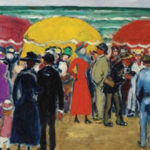We run our website the way we wished the whole internet worked: we provide high quality original content with no ads. We are funded solely by your direct support. Please consider supporting this project.
What is the significance of Deuteronomy 13:1–3?
Moses tells the Israelites that God allowed false prophets to sometimes be correct because “the Lord your God is testing you, to know whether you indeed love the Lord your God with all your heart and soul.”
If God already knows such matters with certainty, Scripture’s inspired description as to why such testings take place (viz. for God “to know…”) cannot be correct. If we believe that Scripture cannot err, it seems we should conclude that God does not necessarily foreknow such matters after all.
Category: Q&A
Tags: Open Theism, Q&A
Topics: Open Theism
Verse: Deuteronomy 13
Related Reading

What is the significance of Isaiah 38:1–5?
God tells Hezekiah “you shall die: you shall not recover” (vs. 1). Hezekiah pleads with God and God decides to “add fifteen years” to his life. As we noted concerning 2 Kings 20:1–5, if God foreknew that he wasn’t going to end Hezekiah’s life, his declaration that he intended to do so and his decision…

Shouldn’t preachers rally Christians to fight political injustice?
Question: My pastor has publicly supported your book The Myth of a Christian Nation. But he’s recently called on the church to take a stand against the injustice of our local government cutting funding for inner city recreational facilities. This seems right to me, since we’re suppose to defend the cause of the poor and…

What do you think of the left wing Christians who are calling on Christians to stand up for “biblical justice”?
Yes, we’ve been hearing a lot of this recently, especially from more “progressive” (left-tending) Christians calling on people to vote “God’s politics” and stand up for “biblical justice.” On the one hand, I along with everyone else applaud such rhetoric, for what Bible-believing Christian in their right mind would take a stand against “biblical justice”?…

How do you respond to Galatians 1:15–16?
“…when God, who had set me apart before I was born and called me through his grace, was pleased to reveal his Son to me…I did not confer with any human being…” As with Jeremiah (Jer. 1:5), John the Baptist (Luke 1:13–17) and other God-ordained prophets, Paul was aware that God had decided on a…

How do you respond to Ephesians 1:4-5?
Question: Ephesians 1 refers to believers as predestined before the foundation of the world. How do you reconcile this with your view that free actions of people (like choosing to believe in Christ) can’t be predestined or even foreknown ahead of time? Answer: It took three hundred years before anyone in Church history interpreted the…

What is the right way to interpret Revelation?
Few biblical topics have captured the imagination of contemporary evangelicals like the book of Revelation. The recent unprecedented success of the Left Behind series is evidence of this popular fascination. Many evangelicals don’t realize that the futuristic interpretation of Revelation advocated in this popular series is only one of several interpretations evangelicals espouse. Here’s the…
